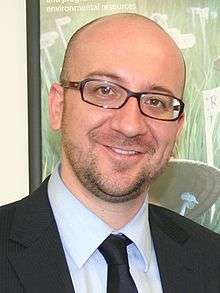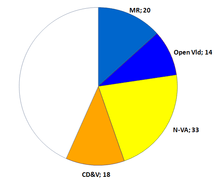Michel Government
| Michel Government | |
|---|---|
|
94th cabinet of Belgium (since 1830) | |
 | |
| Date formed | 11 October 2014 |
| People and organisations | |
| Head of state | Philippe of Belgium |
| Head of government | Charles Michel |
| Member party |
N-VA (Flemish) MR (Walloon) CD&V (Flemish) Open Vld (Flemish) |
| Status in legislature |
Coalition 83 / 150
|
| History | |
| Election(s) | 2014 |
| Incoming formation | 2014 Belgian government formation |
| Predecessor | Di Rupo |

The Michel Government is the incumbent Federal Government of Belgium formed following the 2014 Belgian government formation and sworn in on 11 October 2014. The administration is a centre-right coalition of the New Flemish Alliance, the Christian Democratic and Flemish, the Open Flemish Liberals and Democrats and the Reformist Movement. The prime minister is Charles Michel. The government has an agenda of socio-economic reforms, especially through austerity measures, with its priorities being improving Belgium's economic competitiveness and reducing unemployment.
Investiture and status in parliament

The government was sworn in on 11 October 2014, taking the oath of office before King Filip of Belgium. The four parties had a majority in the Chamber of Representatives with 85 members out of 150. On 16 October 2014, the motion of confidence from the Chamber of Representatives was approved by a vote of 84 in favour, 58 against and one abstention (by Aldo Carcaci, the People's Party MP).[1]
The government's number of seats was reduced to 83 when two N-VA members, Hendrik Vuye and Veerle Wouters, left the party in September 2016.
Coalition
The government consists of a centre-right coalition of the New Flemish Alliance (N-VA), Christian Democratic and Flemish (CD&V), the Open Flemish Liberals and Democrats (Open Vld) and the Reformist Movement (MR). It is nicknamed "Swedish coalition" inasmuch as the party colours yellow (N-VA) and blue (liberal, i.e. MR and Open Vld) and the cross (christianism, i.e. CD&V) are combined on the Swedish flag. Initially (given doubts about its durability) the government was also called a "kamikaze coalition", inasmuch as the MR is the only French-speaking party in the coalition.
For the first time in 25 years, the French-speaking Socialist Party did not become a part of the federal government, whereas the Flemish nationalist N-VA helped form a government for the first time. Initially no French-speaking party wanted to partner with the N-VA, but in negotiations MR agreed to do so on the condition that the government's focus would be on socio-economic issues and that no "community-related" issues (as arise in the complex Belgian federal system) or constitutional reform plans would be part of the cabinet programme.
An often recurring subject was whether or not a capital gains tax should be introduced, together with a general tax reform. In the summer of 2017, the corporate gains tax was announced to be reduced from 33.99% to 29% starting 2018 and further down to 25% from 2020 whereas a capital gains tax of 0.15% on gains on financial securities was introduced for wealthier citizens holding accounts of at least 0.5 million Eur in value. Meanwhile the first 627 Eur of income through dividends became tax exempt.
Measures and protests
Despite three parties (all but N-VA) having been part of the preceding Di Rupo Government as well, the programme of this coalition differs substantially from the previous one. The emphasis is on socio-economic reforms, especially through austerity measures. Important goals for the parties include helping businesses become more competitive, and increasing job growth.
The announced measures were met by protests primarily from the labour unions, which argued that the measures favour employers and disproportionately burden employees and families. The unions, ACV/CSC, ABVV/FGTB and ACLVB/CGSLB, which play an important and institutionalised role in Belgium's political process, did not accept the government's offer for dialogue, maintaining that the government was not seriously inclined to reconsider any of the measures. Instead, the unions organised several regional and national strikes in November and December 2014, culminating in a one-day general strike on 15 December.[2]
Events
The government presided over the arrest of suspects who were accused of playing a role in the Paris attacks of November 2015, as well as a terrorist attack in Brussels in March 2016.
Composition
The Constitution requires an equal number of Dutch- and French-speaking ministers (regardless of the Prime Minister). Since MR is the only French-speaking party, it has more ministers than it would otherwise get with its electoral weight; this is compensated by having only Dutch-speaking Secretaries of State.
| Minister | Name | Party | |
|---|---|---|---|
| Prime Minister | Charles Michel | MR | |
| Deputy Prime Minister – Minister of the Interior, Safety and Director of buildings | Jan Jambon | N-VA | |
| Deputy Prime Minister – Minister of Foreign Affairs | Didier Reynders | MR | |
| Deputy Prime Minister – Minister of Employment, Economy, Consumer Affairs | Kris Peeters | CD&V | |
| Deputy Prime Minister – Development Cooperation, Digital Agenda, Telecom and Postal Services | Alexander De Croo | Open Vld | |
| Minister of the Middle Class, SMEs, Self-employed and Agriculture | Denis Ducarme | MR | |
| Minister of Budget | Sophie Wilmès | MR | |
| Minister of Energy | Marie-Christine Marghem | MR | |
| Minister of Mobility | François Bellot | MR | |
| Minister of Pensions | Daniel Bacquelaine | MR | |
| Minister of Defence | Steven Vandeput | N-VA | |
| Minister of Finance and fighting Fiscal Fraud | Johan Van Overtveldt | N-VA | |
| Minister of Justice | Koen Geens | CD&V | |
| Minister of Social Affairs and Health | Maggie De Block | Open Vld | |
| Secretary of State | Name | Party | |
| Secretary of State for Asylum, Migration and Administrative Simplification | Theo Francken | N-VA | |
| Secretary of State for Equal Rights, Disabled Persons, Scientific Policy, Urban Policy and fighting Poverty | Zuhal Demir | N-VA | |
| Secretary of State for Foreign Trade | Pieter De Crem | CD&V | |
| Secretary of State for Social fraud, Privacy and the North Sea | Philippe De Backer | Open Vld | |
Changes in composition
- On May 21, 2015 the portfolios Urban Policy and fighting Fiscal Fraud were re-allocated between three N-VA members. Urban Policy moved from Jan Jambon to Elke Sleurs, while Sleurs handed over Fiscal Fraud to Johan Van Overtveldt.[3]
- On September 21, 2015 it was announced that minister of Budget Hervé Jamar (MR) would resign to become governor of Liège. He was succeeded by Sophie Wilmès (MR).[4]
- On March 25, 2016, in the aftermath of the March 2016 terrorist attacks in Brussels, Interior Minister Jan Jambon and Justice Minister Koen Geens both offered their resignation over their failure to detain one of the suspects, Ibrahim el-Bakraoui, despite warnings from Turkey's government in 2015. Michel rejected both resignations and the government's composition remained unchanged.[5]
- On April 15, 2016, in the aftermath of the March 2016 terrorist attacks in Brussels, minister of mobility Jacqueline Galant (MR) resigned, after it became known that prior to the attacks she had received a summary of a damning European Commission report (2015) on security at Belgian airports.[6][7] Two days later she was replaced by François Bellot.[8][9]
- On April 29, 2016, Bart Tommelein (Open Vld) left his position as Secretary of State for Social fraud, Privacy and the North Sea to replace Annemie Turtelboom who had resigned earlier that same day as Flemish Minister for Finance, Budget and Energy in the Flemish Government. While Tommelein was replacing Turtelboom, he was himself replaced by Philippe De Backer who gave up his position as Member of the European Parliament.[10]
- On February 20, 2017, Elke Sleurs (N-VA) announced she would leave her position as Secretary of State for Equal Rights, Disabled Persons, Scientific Policy, Urban Policy and fighting Poverty to become lijsttrekker in Ghent for the upcoming 2018 municipal elections.[11] Three days later, the N-VA decided to replace Sleurs with Zuhal Demir. Demir was sworn in by the King on 24 February 2017.[12]
- On July 26, 2017, Willy Borsus (MR) was appointed Minister-President of the Walloon Government, leaving his position as Minister of the Middle Class, SMEs, Self-employed and Agriculture, which was taken by Denis Ducarme.[13]
References
- ↑ "De federale regering krijgt het vertrouwen van de Kamer". deredactie.be. 16 October 2014.
- ↑ "Belgium grinds to a halt for one-day general strike". The Guardian. 2014-12-15. Retrieved 2014-12-15.
- ↑ Redactie. "Sleurs (N-VA): "Dit is geen degradatie"". De Morgen.
- ↑ Jamar wordt gouverneur van Luik
- ↑ Mortimer, Caroline (24 March 2016). "Brussels attacks: Belgian interior and justice ministers offer their resignation in wake of assault on city". The Independent. Retrieved 25 March 2016.
- ↑ “Unacceptable that Parliament was not informed”
- ↑ Belgium minister quits in Brussels airport security row
- ↑ “Unacceptable that Parliament was not informed”
- ↑ François Bellot wordt nieuwe minister van Mobiliteit
- ↑ “Bart Tommelein succeeds Annemie Turtelboom”
- ↑ “Bracke zet stap opzij als lijsttrekker in Gent, Sleurs neemt over en vertrekt als staatssecretaris”
- ↑ Zuhal Demir: "Ik ben een madame van de aanpak"
- ↑ Willy Borsus wordt Waals minister-president